Ten Things You Can do to Prevent Stormwater Runoff Pollution
1. Never dump anything down storm drains or in ditches
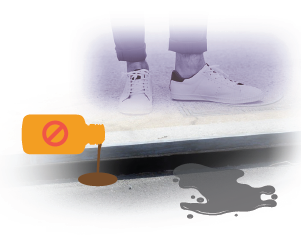 Many people wrongly think that storm drains are part of a sanitary sewer system that
flow to a wastewater treatment plant. Actually, storm drains are a direct link to
local streams, rivers, lakes and wetlands.
Many people wrongly think that storm drains are part of a sanitary sewer system that
flow to a wastewater treatment plant. Actually, storm drains are a direct link to
local streams, rivers, lakes and wetlands.
If you need to dispose of something and not sure where to put it, contact your County Extension Office to ask about safe ways to dispose of the materials.
2. Pick up after your pet
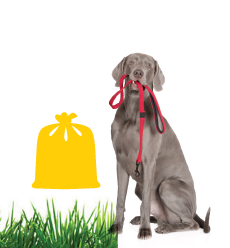
Pet waste that is left on streets, sidewalks, yards, or trails near streams can easily wash into area creeks and streams. The city of Fayetteville alone produces about 2 million pounds of dog waste a year. Not all this ends up in our water, but even a fraction when added to the rest of NWA, creates quite a pollution load for our water.
Pet waste can add harmful bacteria to our water than can make the water unsafe to swim or play in.
Pet waste also has nutrients that cause algae to grow in waterways which can be harmful to the animals that live there.
Always pick up after your pets and dispose of their waste in a trash can or flush
it down the toilet!
3. Check your car for leaking fluids and recycle your motor oil
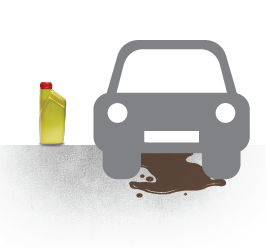 Improper disposal of used oil, which includes oil leaking from cars, contributes significantly
to stormwater pollution. The EPA estimates that American households improperly dump
about 193 million gallons of used oil every year, or roughly the equivalent of 17
Exxon Valdez oil spills.
Improper disposal of used oil, which includes oil leaking from cars, contributes significantly
to stormwater pollution. The EPA estimates that American households improperly dump
about 193 million gallons of used oil every year, or roughly the equivalent of 17
Exxon Valdez oil spills.
If you have an oil leak, do your part and have it repaired. In 2016, there were 547,029 registered cars in Benton and Washington counties. If only a small portion of these had leaks, that is still a significant amount of oil entering our creeks.
If you change your own automotive fluids, recycle your used motor oil. Many places that sell motor oil also collect it for free.
An easy way to clean up an accidental spill is to pour sand or kitty litter over the spill, wait a few minutes and then sweep up the solid materials.
4. Don’t litter! Pick up trash you see on the ground (even if it is not yours) and participate in a creek or watershed clean-up!
No one likes to see trash floating in the water and that is where it will end up if
litter is left on the ground. 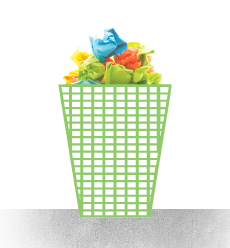 Litter can wash into area creeks and streams through storm drains where water from
our streets goes untreated.
Litter can wash into area creeks and streams through storm drains where water from
our streets goes untreated.
Litter can also be dangerous to wildlife that might mistake it for food or get tangled in the trash.
Participate in a creek, highway, or watershed clean-up. These can be organized community events or something you can do on your own. Take a trash bag and some gloves and go for a nature hike through area creeks. Pick up any trash you find along the way and put in the proper disposal container!
5. Use fertilizers sparingly and sweep driveways and sidewalks after application
Use fertilizers according to your lawn and plant needs and the labeled instructions
Sweep driveways and sidewalks after application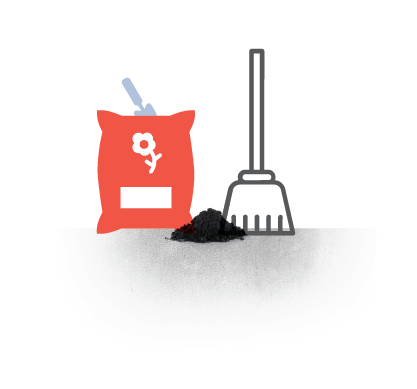
Fertilizers that are applied in excess or scattered onto driveways or sidewalks have the potential to be carried by rain runoff into creeks and streams causing high levels of nutrients in our waters. Too many nutrients can lead to unnatural algae growth creating green “slimy” or “hairy” water that depletes oxygen for aquatic ecosystems.
Soil test before applying fertilizers so you are adding enough nutrients to meet plant needs, but not more than needed. Soil tests are free in Arkansas. Contact your County Extension Office for details on how to submit a soil sample.
6. Compost yard waste and sweep grass clippings out of street gutters after mowing.
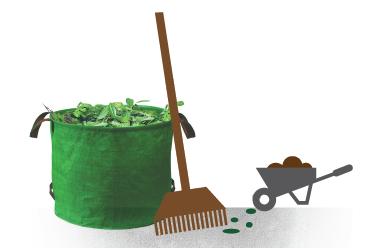
Most people don’t think of grass clippings and leaves as possible pollutants but they can when they end up in waterways through our storm drain system. These materials can contribute nutrients such as nitrogen and phosphorous, which cause unwanted and uncontrolled growth of algae and aquatic weeds in the waterways. Too much algae is harmful to streams and lakes. It blocks sunlight and prevents other plants from growing. When it dies and decays, it also takes much needed oxygen away from fish.
Mulch leaves by running the lawnmower over them and leaving the shredded leaves and grass in the lawn. This also adds needed nutrients back to your lawn minimizing the need of added fertilizers.
Or consider making a compost bin or pile. Get our composting tips.
Be sure to sweep up any leaves and grass from driveways and sidewalks so they don’t end up down the storm drain.
7. Direct downspouts away from paved surfaces and slow water down
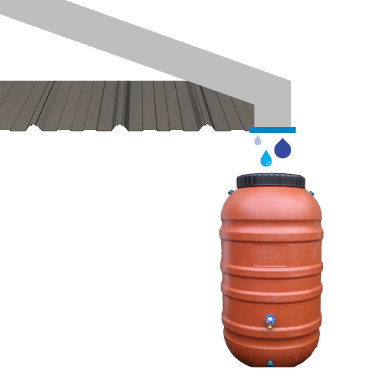
When rain falls on a roof, its momentum increases and gives it more power to wash pollutants into storm drains. Storm drains carry rainwater untreated to area creeks and streams. By diverting your gutter downspouts to grassy areas, runoff can be slowed and allowed to soak into the soil.
Increased stormwater flows also create a larger and faster flushing of creeks when it rains. This accelerates stream bank erosion. Erosion leads to murky water that can have impacts on the stream’s wildlife and increase algae growth from nutrients in the soil.
Consider building a rain barrel or installing a rain garden to capture the rain as it flows off roofs.
Check out our residential stormwater management resources to learn about how to direct downspouts and using terraced landscapes to manage water flow.
8. Wash your car at a commercial car wash that is plumbed to a treatment plant instead of washing your car on a driveway or street
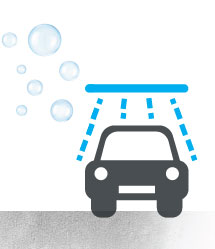
When you wash your car on the driveway or street the dirt, grease, and soap can wash into storm drains directly to creeks and streams.
Concentrations of detergents in streams can kill fish and their eggs, as well as disrupt their ability to reproduce. Detergents can also destroy the natural protections fish have against bacteria and parasites and can severely damage fish gills. The phosphates from soap can also cause excess algae to grow in our waterways. Excessive algae growth makes water cloudy, green, unattractive, smelly, and unpleasant for swimming, boating, fishing, or drinking.
What you can do:
- Take your car to the car wash where the rinse water goes to a wastewater treatment plant instead of storm drains. Most newer car washes in NWA are piped to treatment plants.
- If you do wash your car at home, do it on grassy or gravel areas that can absorb the water without it washing into the street.
9. Use integrated pest management practices for controlling pests around your home
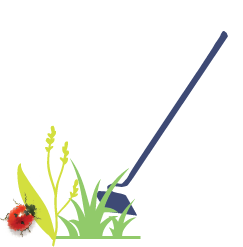
Use pesticides cautiously. If pesticides are necessary, use only recommended amounts.
Excess pesticides applied to lawns and around surfaces like driveways and sidewalks wash off and pollute streams. These include bug killers, weed killers and fungus treatments.
The most effective and important practice to minimize lawn and garden pests is to observe what is going on in the yard. Many serious disease or insect problems can be stopped or slowed down early by observation and timely intervention.
Consider an integrated pest management, or IPM approach. IPM is a process you can use to solve pest problems while minimizing risks to people and the environment. More on pest management can be found at https://www.uaex.uada.edu/farm-ranch/pest-management/
10. Vegetate bare spots in your yard and terrace slopes to minimize erosion
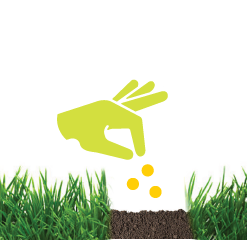
Cover bare spots in your yard with mulch or vegetation
Leaving bare soil in your landscape can cause exposed soil to wash away during a rain. On slopes, rain water will move quickly taking with it any soil that it can along the way. These soils can fill water channels and make the water murky. This makes it difficult for aquatic life to find food or breathe.
If you have a hard time getting grasses to grow, you might consider planting ground covers. Some options may include periwinkle, virginia creeper, liriope or mondo grass, moss or mulch. Check with local nurseries about what ground covers work well for your growing conditions.
If your yard is sloped, think about terracing the land into steps to help slow down the water as it moves across your property.
Looking for more ways to get involved?
Follow #KnowtheFlowNWA on social media for more ideas and sign up to our email list!
